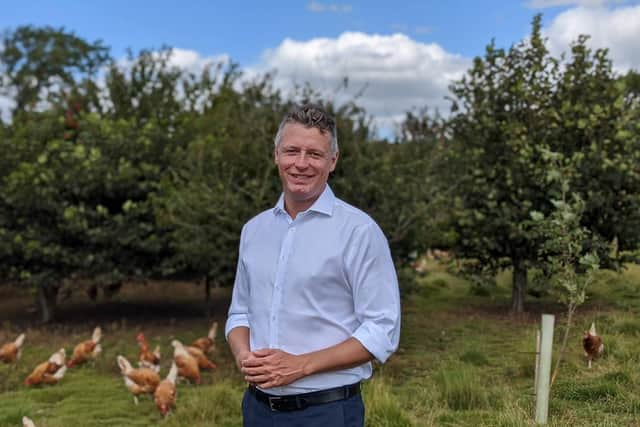Government has a choice between backing British farmers or Donald Trump over food standards, Labour says
Shadow environment secretary Luke Pollard said he was expecting a Tory rebellion when the Agriculture Bill returns to the Commons on October 12, and that Conservative MPs in former red wall seats had an opportunity to prove themselves.
The House of Lords last month passed an amendment to strengthen the newly-formed Trade and Agriculture Commission to give it more powers over future trade deals that could allow cheaper food to flood the UK market, potentially putting British farmers out of business as they struggle to compete.
Advertisement
Hide AdAdvertisement
Hide AdAnd the campaign has gained support from groups such as the NFU as well as celebrity chefs Jamie Oliver, Joe Wicks, and Hugh Fearnley-Whittingstall.


Mr Pollard said: “At the moment, the Trade and Agriculture Commission is a sound bite. It's not a proper body that could stop a trade deal that undercuts our farmers.”
The shadow environment secretary said: “It's not just politics, I think there is a genuine risk that not just in a US trade deal, but a trade deal with Australia, our farmers will be undercut by industrial agriculture, and methods that would be illegal if they were used in the UK.”
And it was not just concerned over the often used examples of chlorinated chicken or hormone-treated beef.
Advertisement
Hide AdAdvertisement
Hide AdHe said: “They're the ones that people understand the most, but there are other examples of other crops. So take, for example, wheat, grain from the US that's been sprayed with chemicals that are banned in the European Union, because of the effects on bees, they kill our pollinators, it would be illegal for farmers to use chemicals in the UK.
“We know from the US negotiating objectives for a trade deal that they want to see full access to our food and agriculture sector, it's spelt out in black and white, the US ambassador to the UK has stressed that that is one of their key objectives in a trade deal.
“So we know that's what they want. But I can't see anything in law that prevents that from happening.”
Mr Pollard said that substandard food would not necessarily end up on supermarket shelves immediately but instead used in cafes and restaurants where menus do not have ingredient lists.
Advertisement
Hide AdAdvertisement
Hide Ad“By selling cheaper food into those environments, you reduce the market fee for British farmers,” he said. “Once you've started that process, it will eventually seep through the entire food sector.”
And he said eventually this would hit those on the breadline who would opt for cheaper food.
“We've spent decades improving our animal welfare standards, so even cheaply-produced food in the UK still upholds the basic animal welfare standards and decent environmental standards.
“Now, we are on the cusp of having decades of good work by our farmers and the British public undone with future trade deals that Parliament won't be able to vote on.
Advertisement
Hide AdAdvertisement
Hide Ad“So even if there's a provision that would undercut our farmers I won't get to vote, Conservative MPs won't get a vote, no one gets a vote on it. And I don't trust the Government, not to screw over our farmers to get a trade deal.”
The Government has consistently said it would uphold its manifesto commitment to high food standards.
A Department for International Trade spokesman said: “We will never sign a trade deal that undercuts farmers and is bad for consumers.
“The department is working around the clock to secure trade agreements that benefit Britain’s brilliant agriculture industry, uphold its high standards, and open new export opportunities around the world. If a deal isn’t the right one, we will walk away.
Advertisement
Hide AdAdvertisement
Hide Ad“It is already against the law to import chlorine-washed chicken and hormone-fed beef into the UK, and any changes would need new legislation to be brought before Parliament. Ultimately if Parliament doesn’t like a deal, it can block it.
“The Trade and Agriculture Commission is all about putting UK farming at the heart of our trade policy. It advises the Government how to secure new opportunities farmers in Yorkshire and across the UK, while ensuring the industry remains competitive and that our world-leading standards are not undermined.”
But Mr Pollard said that was “an issue of trust”.
He said: “If they believed that they were going to implement their manifesto commitments that they won the election on, then why would they have any problems with putting their manifesto into law?
“The fact they voted against it twice should tell us everything we need to know, that they are using our food and farming standards - and as an extension our farmers - as a negotiating tool in the negotiations with the US.
Advertisement
Hide AdAdvertisement
Hide Ad“And that will be the case with the US trade deal, with Australia, and one with New Zealand, countries where we are at risk of losing large chunks of our own agricultural production.”
Mr Pollard said the Government had defeated attempts for MPs to scrutinise new trade deals, and warned: “We're running out of chances to protect our farmers.”
And he added words of caution to new Conservative MPs in rural areas, as he said: “For lots of Tory MPs in rural seats that have farms in their constituencies, especially those that won those seats from Labour in the last election, this is a key test about who they're standing up for.”
He added: “The Government is on the wrong side of public opinion.
“They have a choice about whether they back the British public and our farmers, or whether they side with Donald Trump.”
Comment Guidelines
National World encourages reader discussion on our stories. User feedback, insights and back-and-forth exchanges add a rich layer of context to reporting. Please review our Community Guidelines before commenting.